通用 小升初英语语法讲解通用版 11.比较级和情态动词 课件(共21张PPT)
文档属性
| 名称 | 通用 小升初英语语法讲解通用版 11.比较级和情态动词 课件(共21张PPT) | 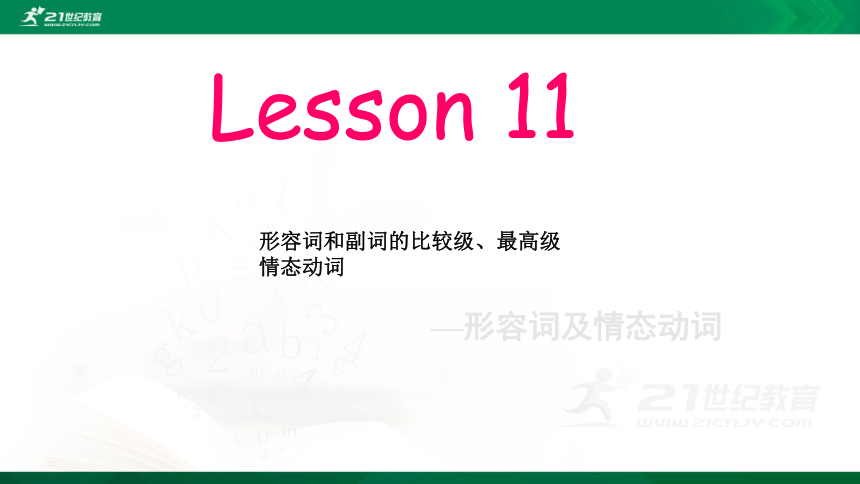 | |
| 格式 | ppt | ||
| 文件大小 | 1.2MB | ||
| 资源类型 | 试卷 | ||
| 版本资源 | 通用版 | ||
| 科目 | 英语 | ||
| 更新时间 | 2021-05-07 14:56:14 | ||
图片预览

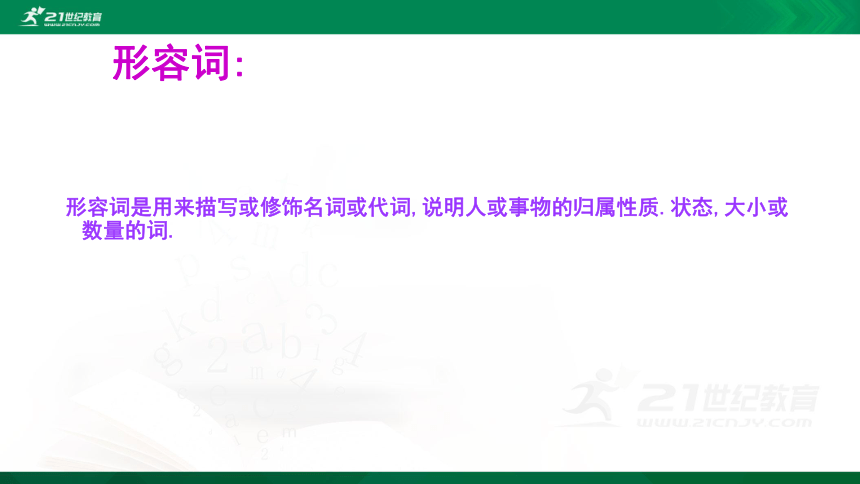
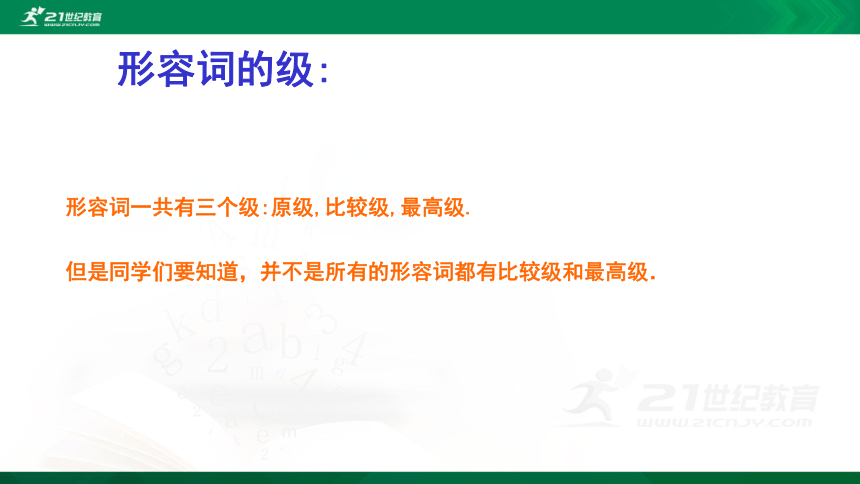
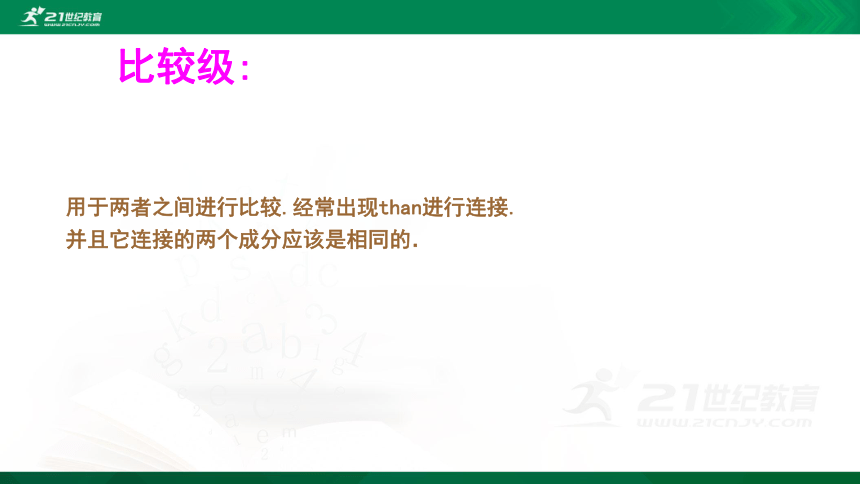

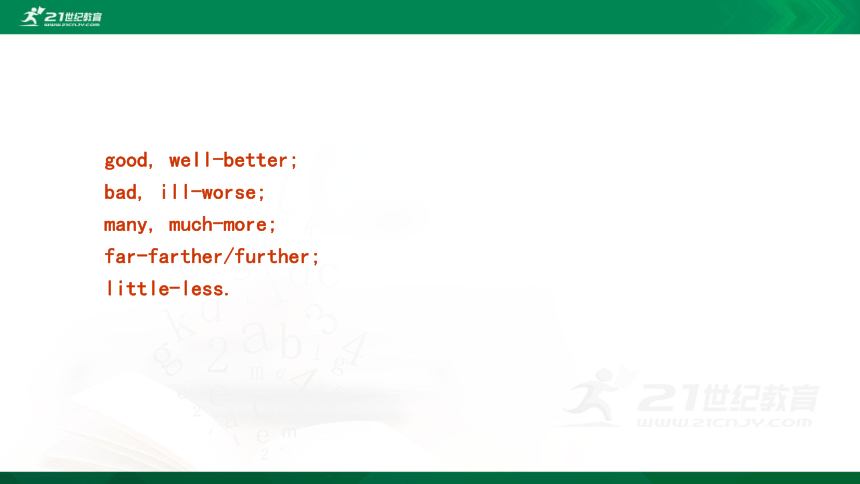
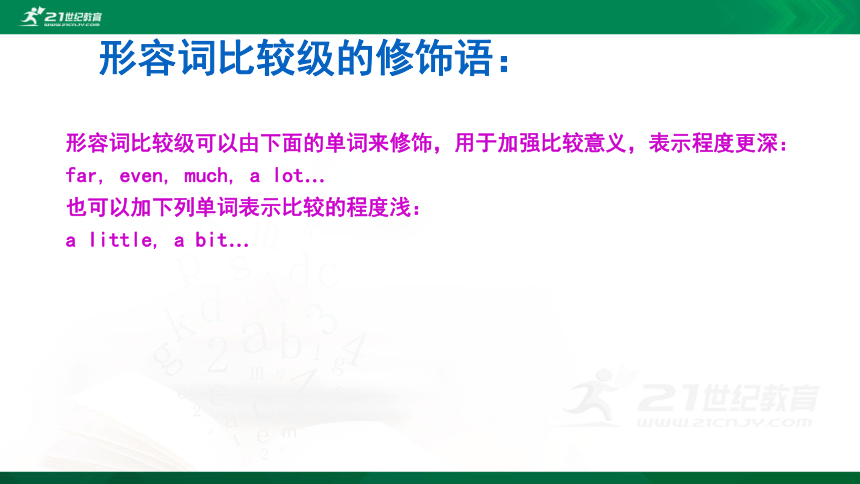
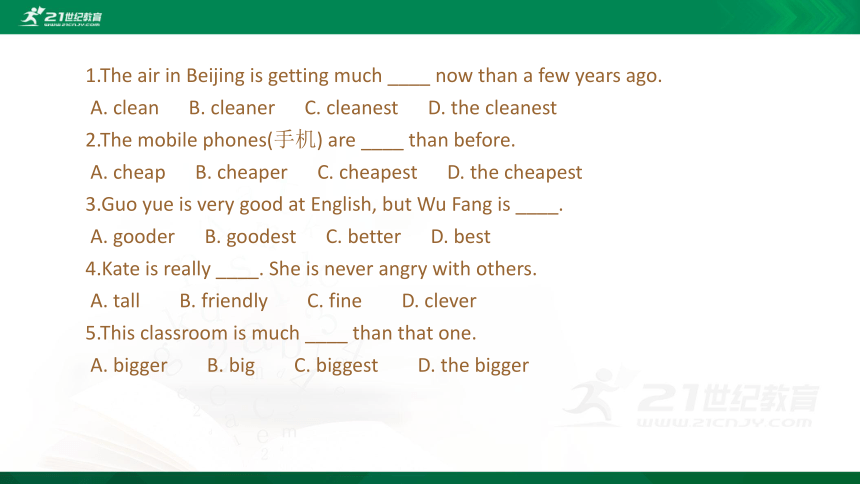
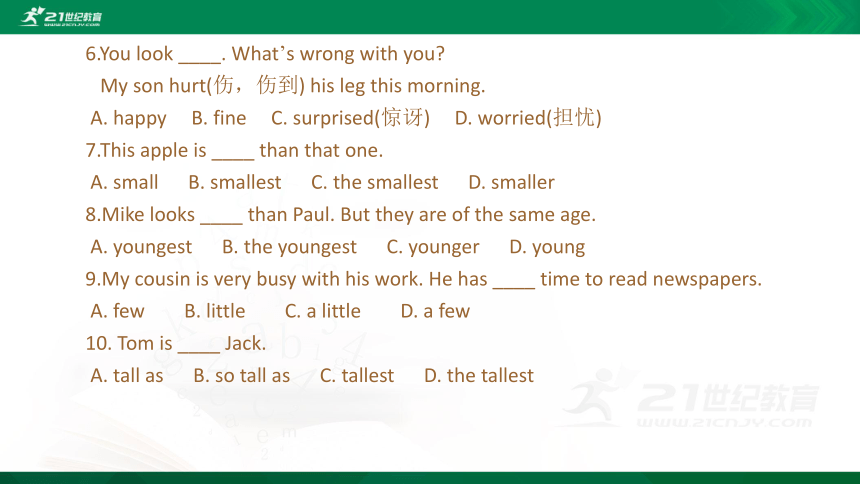
文档简介
—形容词及情态动词
Lesson 11
形容词和副词的比较级、最高级
情态动词
形容词:
形容词是用来描写或修饰名词或代词,说明人或事物的归属性质.状态,大小或数量的词.
形容词的级:
形容词一共有三个级:原级,比较级,最高级.
但是同学们要知道,并不是所有的形容词都有比较级和最高级.
比较级:
用于两者之间进行比较.经常出现than进行连接.
并且它连接的两个成分应该是相同的.
比较级的构成:
1.大多数情况下,直接在词尾加er;
如:strong-stronger, small-smaller
2.以辅音加y结尾的形容词,先变y为i再加er;
如:early-earlier, dirty-dirtier
3.以辅元辅结构结尾,双写最后一个字母再加er;
如:big-bigger, fat-fatter
4.以e结尾的形容词,直接加r;
如:close(接近的)-closer, late-later
5.大多数多音节词,在形容词前加more;
如:beautiful-more beautiful, different-more different
6.不规则变化.
good, well-better;
bad, ill-worse;
many, much-more;
far-farther/further;
little-less.
形容词比较级的修饰语:
形容词比较级可以由下面的单词来修饰,用于加强比较意义,表示程度更深:
far, even, much, a lot…
也可以加下列单词表示比较的程度浅:
a little, a bit…
1.The air in Beijing is getting much ____ now than a few years ago.
A. clean B. cleaner C. cleanest D. the cleanest
2.The mobile phones(手机) are ____ than before.
A. cheap B. cheaper C. cheapest D. the cheapest
3.Guo yue is very good at English, but Wu Fang is ____.
A. gooder B. goodest C. better D. best
4.Kate is really ____. She is never angry with others.
A. tall B. friendly C. fine D. clever
5.This classroom is much ____ than that one.
A. bigger B. big C. biggest D. the bigger
6.You look ____. What’s wrong with you?
My son hurt(伤,伤到) his leg this morning.
A. happy B. fine C. surprised(惊讶) D. worried(担忧)
7.This apple is ____ than that one.
A. small B. smallest C. the smallest D. smaller
8.Mike looks ____ than Paul. But they are of the same age.
A. youngest B. the youngest C. younger D. young
9.My cousin is very busy with his work. He has ____ time to read newspapers.
A. few B. little C. a little D. a few
10. Tom is ____ Jack.
A. tall as B. so tall as C. tallest D. the tallest
最高级的构成:
1.大多数情况下,直接在词尾加est;
如:strong-strongest, small-smallest
2.以辅音加y结尾的形容词,先变y为i再加est;
如:early-earliest, dirty-dirtiest
3.以辅元辅结构结尾,双写最后一个字母再加est;
如:big-biggest, fat-fattest
4.以e结尾的形容词,直接加st;
如:close(接近的)-closest, late-latest
5.大多数多音节词,在形容词前加most;
如:beautiful-most beautiful, different-most different
6.不规则变化.
good, well-best;
bad, ill-worst;
many, much-most;
far-farthest/furthest;
little-least.
1.My grandmother is ___ in my family.
A. old B. the oldest C. older D. oldest
2. Alice is ____ in our class.
A. tall B. taller C. tallest D. the tallest
3.I think English is ____ subject of all.
A. interesting B. interestingest
C. the most interesting D. more interesting
4.Lucy chose ____ one among the dresses.
A. the cheaper B. the cheap
C. cheapest D. the cheapest
5. This T-shirt is ____ of the four.
A. the most expensive B. more expensive
C. expensive D. most expensive
6. His dog died yesterday. He thought he was ____ boy in the world.
A. sad B. sadder C. the saddest D. saddest
7.English is ____ subject, I think.
A. useful B. the usefulest
C. the most useful D. more useful
8.Mary is ____ student in her class.
A. goodest B. better C. the goodest D. the best
9. Lily has ____ apples in her class.
A. the more B. many C. the most D. much
10. April is ____ month in China.
A. the wetest B. the wettest C. wet D. wetter
练习答案
1.B
2.D
3.C
4.D
5.A
6.C
7.C
8.D
9.C
10.B
情态动词:
情态动词有自己的词汇意义,表示或者暗示某种情绪或态度,表示可能,建议,愿望,必要,允许,能力等.
所有的人称均可与情态动词连用,情态动词本身不随主语的不同而变化,其后要跟动词原形.
常见的情态动词:
1.can, can’t(过去式could,否定式couldn’t.可能,能)
2.may(否定式只能用may not,没有缩写形式)
3.must(必须,一定.用它提问时否定回答应该用No, you needn’t.)
4.should(应该)
5.shall, shan’t; will, won’t(它们也是情态动词.将会)
6.would(是will的过去式,可用于各种人称,表示“意志”,“意愿”和“决心”等)
7.need(需要做某事,一般和to连用)
1.Buses and cars ____ stop when the traffic lights are red.
A. can B. must C. may D. need
2.We ____ do our homework after class.
A. can B. may C. should D. need
3.She ____ know the answer, I’m not sure.
A. can B. may be C. may D. need
4.Must I go with them tomorrow? No, you ____.
A. mustn’t B. shouldn’t C. needn’t D. can’t
5. ____ I know your name, please?
A. Must B. Will C. May D. Need
6.____ you be happy!
A. May B. Can C. Must D. Would
7.____ I use your book? Of course, here you are.
A. Should B. May C. Need D. Must
8.Mary ____be at home. I saw her in the library just now.
A. mustn’t B. needn’t C. shouldn’t D. can’t
9.____ we swim in the river?
A. Must B. Should C. Can D. Will
10.Must we clean the classroom now? No, you____.
A. mustn’t B. can’t C. shouldn’t D. needn’t
练习答案:
1.B
2.C
3.C
4.C
5.C
6.A
7.B
8.D
9.B
10.D
谢谢
21世纪教育网(www.21cnjy.com) 中小学教育资源网站
有大把高质量资料?一线教师?一线教研员?
欢迎加入21世纪教育网教师合作团队!!月薪过万不是梦!!
详情请看:
https://www.21cnjy.com/help/help_extract.php
Lesson 11
形容词和副词的比较级、最高级
情态动词
形容词:
形容词是用来描写或修饰名词或代词,说明人或事物的归属性质.状态,大小或数量的词.
形容词的级:
形容词一共有三个级:原级,比较级,最高级.
但是同学们要知道,并不是所有的形容词都有比较级和最高级.
比较级:
用于两者之间进行比较.经常出现than进行连接.
并且它连接的两个成分应该是相同的.
比较级的构成:
1.大多数情况下,直接在词尾加er;
如:strong-stronger, small-smaller
2.以辅音加y结尾的形容词,先变y为i再加er;
如:early-earlier, dirty-dirtier
3.以辅元辅结构结尾,双写最后一个字母再加er;
如:big-bigger, fat-fatter
4.以e结尾的形容词,直接加r;
如:close(接近的)-closer, late-later
5.大多数多音节词,在形容词前加more;
如:beautiful-more beautiful, different-more different
6.不规则变化.
good, well-better;
bad, ill-worse;
many, much-more;
far-farther/further;
little-less.
形容词比较级的修饰语:
形容词比较级可以由下面的单词来修饰,用于加强比较意义,表示程度更深:
far, even, much, a lot…
也可以加下列单词表示比较的程度浅:
a little, a bit…
1.The air in Beijing is getting much ____ now than a few years ago.
A. clean B. cleaner C. cleanest D. the cleanest
2.The mobile phones(手机) are ____ than before.
A. cheap B. cheaper C. cheapest D. the cheapest
3.Guo yue is very good at English, but Wu Fang is ____.
A. gooder B. goodest C. better D. best
4.Kate is really ____. She is never angry with others.
A. tall B. friendly C. fine D. clever
5.This classroom is much ____ than that one.
A. bigger B. big C. biggest D. the bigger
6.You look ____. What’s wrong with you?
My son hurt(伤,伤到) his leg this morning.
A. happy B. fine C. surprised(惊讶) D. worried(担忧)
7.This apple is ____ than that one.
A. small B. smallest C. the smallest D. smaller
8.Mike looks ____ than Paul. But they are of the same age.
A. youngest B. the youngest C. younger D. young
9.My cousin is very busy with his work. He has ____ time to read newspapers.
A. few B. little C. a little D. a few
10. Tom is ____ Jack.
A. tall as B. so tall as C. tallest D. the tallest
最高级的构成:
1.大多数情况下,直接在词尾加est;
如:strong-strongest, small-smallest
2.以辅音加y结尾的形容词,先变y为i再加est;
如:early-earliest, dirty-dirtiest
3.以辅元辅结构结尾,双写最后一个字母再加est;
如:big-biggest, fat-fattest
4.以e结尾的形容词,直接加st;
如:close(接近的)-closest, late-latest
5.大多数多音节词,在形容词前加most;
如:beautiful-most beautiful, different-most different
6.不规则变化.
good, well-best;
bad, ill-worst;
many, much-most;
far-farthest/furthest;
little-least.
1.My grandmother is ___ in my family.
A. old B. the oldest C. older D. oldest
2. Alice is ____ in our class.
A. tall B. taller C. tallest D. the tallest
3.I think English is ____ subject of all.
A. interesting B. interestingest
C. the most interesting D. more interesting
4.Lucy chose ____ one among the dresses.
A. the cheaper B. the cheap
C. cheapest D. the cheapest
5. This T-shirt is ____ of the four.
A. the most expensive B. more expensive
C. expensive D. most expensive
6. His dog died yesterday. He thought he was ____ boy in the world.
A. sad B. sadder C. the saddest D. saddest
7.English is ____ subject, I think.
A. useful B. the usefulest
C. the most useful D. more useful
8.Mary is ____ student in her class.
A. goodest B. better C. the goodest D. the best
9. Lily has ____ apples in her class.
A. the more B. many C. the most D. much
10. April is ____ month in China.
A. the wetest B. the wettest C. wet D. wetter
练习答案
1.B
2.D
3.C
4.D
5.A
6.C
7.C
8.D
9.C
10.B
情态动词:
情态动词有自己的词汇意义,表示或者暗示某种情绪或态度,表示可能,建议,愿望,必要,允许,能力等.
所有的人称均可与情态动词连用,情态动词本身不随主语的不同而变化,其后要跟动词原形.
常见的情态动词:
1.can, can’t(过去式could,否定式couldn’t.可能,能)
2.may(否定式只能用may not,没有缩写形式)
3.must(必须,一定.用它提问时否定回答应该用No, you needn’t.)
4.should(应该)
5.shall, shan’t; will, won’t(它们也是情态动词.将会)
6.would(是will的过去式,可用于各种人称,表示“意志”,“意愿”和“决心”等)
7.need(需要做某事,一般和to连用)
1.Buses and cars ____ stop when the traffic lights are red.
A. can B. must C. may D. need
2.We ____ do our homework after class.
A. can B. may C. should D. need
3.She ____ know the answer, I’m not sure.
A. can B. may be C. may D. need
4.Must I go with them tomorrow? No, you ____.
A. mustn’t B. shouldn’t C. needn’t D. can’t
5. ____ I know your name, please?
A. Must B. Will C. May D. Need
6.____ you be happy!
A. May B. Can C. Must D. Would
7.____ I use your book? Of course, here you are.
A. Should B. May C. Need D. Must
8.Mary ____be at home. I saw her in the library just now.
A. mustn’t B. needn’t C. shouldn’t D. can’t
9.____ we swim in the river?
A. Must B. Should C. Can D. Will
10.Must we clean the classroom now? No, you____.
A. mustn’t B. can’t C. shouldn’t D. needn’t
练习答案:
1.B
2.C
3.C
4.C
5.C
6.A
7.B
8.D
9.B
10.D
谢谢
21世纪教育网(www.21cnjy.com) 中小学教育资源网站
有大把高质量资料?一线教师?一线教研员?
欢迎加入21世纪教育网教师合作团队!!月薪过万不是梦!!
详情请看:
https://www.21cnjy.com/help/help_extract.php
